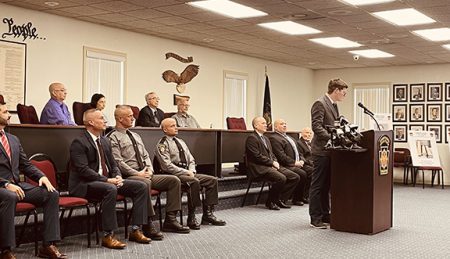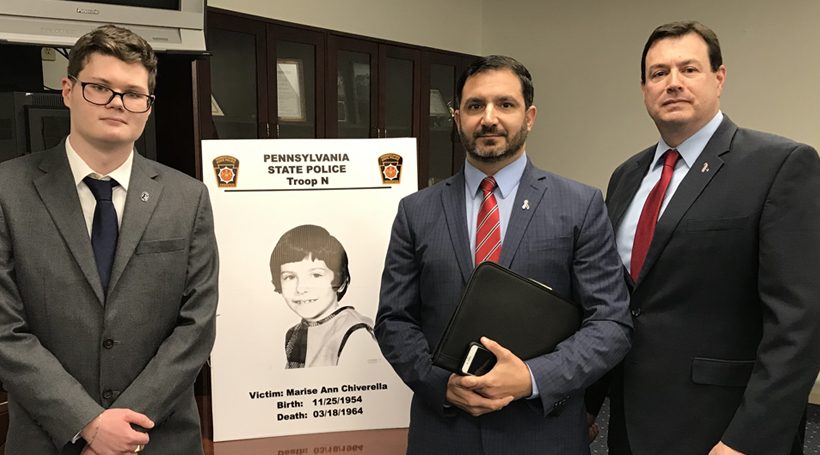It reads like a movie script. A teenage techie a.k.a. genealogy whiz kid hears about a murder. He offers to step in to solve the crime – which he does, flawlessly, modestly and with just a hint of heroism. Except that this is no contrived plot. He is Medford Lakes’ own Eric Schubert, now 20, and his latest claim to fame – among other things – is cracking a 58-year-old murder case.

A former SJ Mag “Kid to Watch,” Schubert has been doing genealogy research for over a decade now. He has his own business, ES Genealogy, where he helps people locate family members and reconnect with lost loved ones. He also volunteers his time to help the police crack cold cases, as in the 1964 murder of 9-year-old Marise Ann Chiverella.
The Chiverella murder occurred in Hazleton, Pa., not too far from where Schubert currently attends college in Elizabethtown, Pa. He read about the case in an old news article and noticed that nothing had been written on it since. Schubert reached out to the Pennsylvania State Police to see if he could help. “I told them if I’m not stepping on toes, and the case is just sitting there, they might want to consider my help. What have you got to lose?”
The thing was, Schubert already had experience solving crimes. Right after he graduated high school, he was contacted by another police department in Montgomery County, Pa. They heard about his success connecting long-lost family members and asked him to put his genealogy skills to work. While he can’t talk about the case publicly yet, he can share its outcome. “I solved it in 4 months,” he says. “I knew I could do this. I just didn’t know if they would trust a kid.”

The District Attorney’s office and the detectives at the Pennsylvania State Police weren’t so sure at first. They came to campus to size him up. Apparently, Schubert passed the test. He was given the case just about the time the world shut down because of Covid. That worked out just fine for Schubert. Like most of us, he was home with time on his hands. He dove full force into the case. But it wasn’t as straightforward as his other DNA research.
Schubert explains it like this. “Let’s say someone is looking for their biological father and they sent me their own DNA results,” he says. “I would say, great, you share 800 centimorgans with 2 top matches on Ancestry.com. Centimorgans are genetic units of measurement. You share a set amount with everyone in your family. One match is related to people in your mother’s family. The other match doesn’t fit in, so clearly, it must be on your unknown father’s side. You share 800 centimorgans, and you’re the same age, which means you’re probably first cousins.” He would continue narrowing down the process, and going back generations as needed to find the client’s biological father.
However, the top match in the Chiverella case was just 53 centimorgans – not 800 – and the trail led to Italy. “Going through all that data and trying to build a family tree, it’s like a big game of hot and cold,” says Schubert. “It was 2 years of narrowing down the possibilities. I was in touch with the lead investigator pretty much every single day, sometimes multiple times a day.”
As luck would have it, Schubert ultimately found a historian who provided the family tree that led to the big break. “I pretty much knew that we solved it before we had official confirmation,” says Schubert. “This result came in, and in my mind, I knew we had it. But the police say we’ve got more work to do. The second result came in and I think oh my gosh, we have him. The cops say no, we have more work to do. When I got the phone call that the odds of this DNA being someone else’s were 1 in 300 septillion, I knew for sure. That was a good phone call.”
Schubert was front and center at the press conference when police revealed the killer as James Paul Forte in February 2022. Forte is no longer alive, but the case provided much-needed closure for the Chiverella family. “Mr. Schubert provided a service that we would have never expected, and he reached out to us,” says Hazleton State Police Trooper Anthony Petrosky. “We are proud to have him here.”
It was a milestone moment for Schubert too. “Solving the Chiverella case was probably the hardest thing I’ve done in my life, period,” he says, “not just genealogy, but period.”
That’s saying a lot considering how much Schubert has accomplished at such a young age. At around 10 years old, he taught himself how to interpret DNA results and took the idea of doing genealogy research on Ancestry.com to a new level. As an incoming high school freshman, he started his own company rather than working for minimum wage at a summer job. Schubert has helped provide both closure and connections for his clients. And he was the driving force through it all. “Like pretty much everything I do in my life, I just figured it out on my own,” he says.
Schubert says he’s driven in part by the search and the hunt. “It’s finding that missing puzzle piece,” he says, but that’s not all. “Being able to share the answer with someone, who’s been looking way longer than you’ve even been alive, is really emotional. That’s why I do this.”
As for where he might take his gift, the future is open. While he hasn’t received inquiries from other police departments – yet – he’s open to doing more detective work. “I think genealogy will always be something I’m doing whether it’s primary or secondary,” he says. “As much as sometimes I think I should take a break, I always get pulled back in. I get a text or phone call from someone who needs my help.”
And like the real-life superhero that he is, Schubert answers the call.














